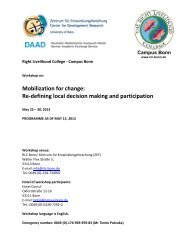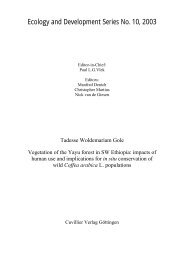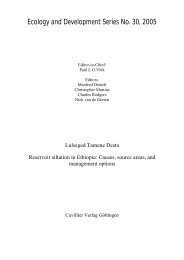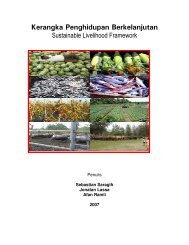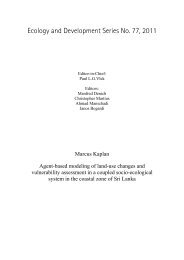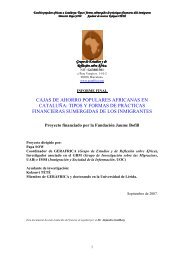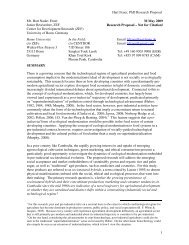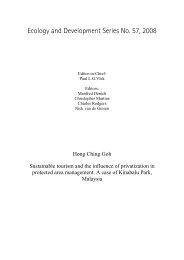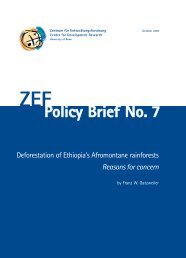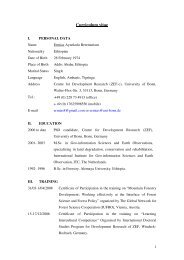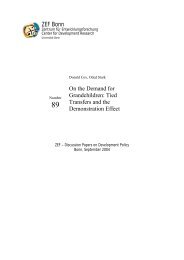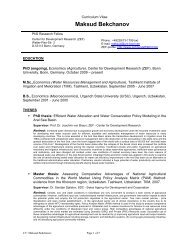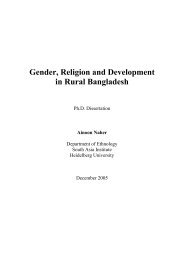ZEF Bonn
ZEF Bonn
ZEF Bonn
You also want an ePaper? Increase the reach of your titles
YUMPU automatically turns print PDFs into web optimized ePapers that Google loves.
4. Preliminary conclusion<br />
In this essay we have developed some tentative hypothesis with regard to the causal<br />
mechanisms responsible for disasters and the interrelationships between the various<br />
factors at work. The approach presented here views both man-made and natural<br />
disasters as the consequences of high vulnerability to extreme events - such as<br />
droughts, wars, or storms. Vulnerability in turn depends not only on the magnitude<br />
and frequency of extreme events (hazards), but also on the coping capacity.<br />
We have developed a series of hypotheses both with regard to hazards and coping<br />
capacities. Regarding the frequency and magnitude of extreme events, our somewhat<br />
surprising conclusion is that, both for natural disasters and for man-made disasters<br />
such as wars, we observe a decrease in casualties and an increase in frequency. At the<br />
same time, at least the economic costs of natural disasters have risen over the past<br />
decade. Our assumption is that this is because coping capacities (especially international<br />
relief efforts) have increased over the past decades, thus allowing for a lowering<br />
of the death toll despite an increasing number of wars and natural disasters.<br />
However, there are severe limitations in the data base-we above all lack longitudinal<br />
data on victims of civil wars and on civilian casualties. We also encountered a reporting<br />
problem concerning the number of natural disasters. Much more research is<br />
needed to confirm the general hypothesis that we derive from our exercise in trend<br />
estimation: that the world, on average, has become a much safer place, in contrast to<br />
the fin-de-siècle pessimism that dominates certain sectors of the published opinion.<br />
On the other hand, our data also clearly show that the risks of exposure to disasters<br />
are very unequally distributed over the planet. They are much higher for people<br />
living in low income developing countries, where most major wars of the recent<br />
decades were fought and where most of the victims of natural disasters were to be<br />
found. Our hypothesis is that a weaker coping capacity explains this unequal pattern<br />
of distribution:<br />
● a higher frequency and intensity of violent political conflict destroying the institutional<br />
capacity to react to extreme events. This higher frequency can be attributed<br />
to the early stages of processes of nation-state formation that often<br />
entail the politicisation of ethno-cultural differences and that may escalate into<br />
civil wars.<br />
● a higher degree of poverty which makes survival and prevention strategies such<br />
as insurances inaccessible because long-term investing in mitigation of future<br />
risks is not affordable for poor people; poverty also reduces the capacity for<br />
institution building beyond the social capital invested in everyday social networks.<br />
Weak institutional development in turn represents a major disadvantage<br />
for developing adequate coping strategies.<br />
● a more intense degradation in the natural resource bases and at the same time a<br />
higher dependency on natural resources that both reduce the space for adaptation<br />
and recovery in the face of extreme events. The high level of degradation<br />
may be explained by geographic location, higher rates of population growth,<br />
higher dependency on agriculture and lower institutional capacities to implement<br />
conservation strategies.<br />
Essay<br />
The risks of exposure to disasters<br />
are much higher for people<br />
in low income developing<br />
countries, where most of the<br />
victims of natural disasters<br />
were to be found. This unequal<br />
pattern of distribution is due<br />
to a weaker coping capacity in<br />
these countries.<br />
25



